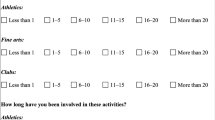Abstract
This study compares the effects of two methods of teaching—teacher-centered and cooperative learning—on students’ science achievement and use of social skills. The sample consists of 163 female elementary science students in 8 intact grade 5 classes who were assigned to 2 instructional methods and were taught an identical science unit by 4 classroom teachers. The students’ science achievement was measured by a researcher-designed achievement test given to students as a pretest and a posttest. Students’ social skills were determined by a researcher-designed survey administered as a pretest and posttest. Analysis of the achievement test scores and the social skills survey responses revealed that cooperative learning strategies have significantly (p > 0.05) more positive effects on both students’ achievement and social skills than teacher-centered strategies. These results provide an evidential base to inform policy decisions and encourage and persuade teachers to implement cooperative learning methods in Kuwaiti classrooms.
Similar content being viewed by others
References
Adams, D. & Hamm, M. (1996). Cooperative learning, critical thinking and collaboration across the curriculum (2nd ed.). Springfield: Charles Thomas.
Al-Kandari, A. (2006). To what extent science education objectives are presented in science teachers’ lesson plans in Kuwait schools. Kuwait: Academic Publication Council, University of Kuwait.
Baloche, L. (1998). The cooperative classroom: Empowering learning. Upper Saddle River: Prentice Hall.
Charles, C. (1995). Introduction to educational research. New York: Longman.
Cohen, E. G. (1994). Designing group work: Strategies for the heterogeneous classroom. New York: Teachers College Press.
Cohen, E. G., Lotan, R. & Catanzarite, L. (1990). Treating status problems in cooperative classrooms. In S. Sharon (Ed.), Cooperative learning theory and research (pp. 203–230). New York: Praeger.
Effandi, Z. & Zanaton, I. (2007). Promoting cooperative learning in science and mathematics education: A Malaysian perspective. Eurasia Journal of Mathematics, Science & Technology Education, 3(1), 35–39.
Freankel, J. & Wallen, N. (1993). How to design and evaluate research in education. New York: McGraw-Hill.
Gassem, S. A. (2003). The effectiveness of using cooperative learning strategy in teaching science on achievement and scientific thinking: An experimental study in the State of Kuwait. A Series of Psychological and Educational Studies (Vol. 6). Muscat, Oman: Sultan Qaboos University, Collage of Education.
Gustafson, M. H. & Meagher, L. Y. (1993). American’s youngest citizens: Close up for grades 1–8. The Social Studies, 84(5), 213–217.
Johnson, D. W. & Johnson, R. T. (1990). Cooperative learning and achievement. In S. Sharan (Ed.), Cooperative learning: Theory and research (pp. 23–37). New York: Praeger.
Johnson, D. W. & Johnson, R. T. (1993). Cooperative learning and feedback in technology-based interaction. In J. V. Demy & G. C. Sales (Eds.), Interactive instruction and feedback (pp. 133–157). Englewood Cliffs: Educational Elementary Publications.
Johnson, D. W., Johnson, R. T. & Holubec, E. J. (1993). Cooperation in the classroom (6th ed.). Edina: Interaction Book Company.
Johnson, D. W., Johnson, R. T., & Stanne, M. S. (2000). Cooperative learning methods: A meta-analysis. Minneapolis, MN: University of Minnesota. Retrieved from http://www.co-operation.org/pages/cl-methods.html.
Johnson, R. T., & Johnson, D. W. (2001). What is cooperative learning? Minneapolis, MN: Cooperative Learning Center, University of Minnesota. Retrieved from http://www.co-operation.org/pages/cl.html.
Jolliffe, W. (2007). Cooperative learning in the classroom: Putting it into practice. Thousand Oaks: Paul Chapman Publishing.
Jones, G. (1990). Cognitive conflict and cooperative learning. Paper presented at the Annual Meeting of the National Association for Research in Science Teaching. ERIC Document Reproduction Service No. ED 319 598.
Kennedy, L. M. & Tipps, S. (1994). Guiding children’s learning of mathematics (7th ed.). Belmont: Wadsworth.
Lazarowitz, R. & Karsenty, G. (1990). Cooperative learning and student’s academic achievement, process skills, learning environment, and self-esteem in tenth-grade biology classrooms. In S. Sharan (Ed.), Cooperative learning: Theory and research (pp. 143–149). New York: Praeger.
Martin, M. O., Mullis, I. V. S., Gonzalez, E. J. & Chrostowski, S. J. (2004). TIMSS 2003 international science report: Findings from IEA’s Trends in International Mathematics and Science Study at the fourth and eighth grades. Boston: TIMSS & PIRLS International Study Center, Lynch School of Education, Boston College.
McDonald, J. P. (2003). Teachers studying students work: Why and how? Phi Delta Kappan, 84(2), 121–127.
Michael, J. W. (1997). Classroom reward structures and academic performance. Review of Educational Research, 47, 87–98.
Michelson, L., Sugai, D., Wood, R. & Kazdin, A. (1983). Social skills assessment and training with children: An empirically based handbook. New York: Plenum.
Nor Azizah, M. S. & Chong Poh, W. (2000). A review of cooperative learning research and its implication for teacher education. Proceedings of the International Conference on Teaching and Learning, pp. 1266–1289.
Parker, J. G. & Asher, S. R. (1993). Beyond group acceptance: Friendship and friendship quality as distinct dimensions of peer adjustment. In W. H. Jones & D. Perlman (Eds.), Advances In Personal Relationships (Vol. 4). London: Kingley.
Reys, R. E., Suydam, M. N., Lindquist, M. M. & Smith, N. L. (1998). Helping children learning mathematics (5th ed.). Needham Heights: Allyn & Bacon.
Sharan, S. (1990). Cooperative learning: A perspective on research and practice. In S. Sharan (Ed.), Cooperative learning: Theory and research (pp. 285–298). New York: Praeger.
Sharan, S. (1996). Mutually assistant teams for implementing instructional innovations in school. Lifelong Learning in Europe, 1(2), 104–122.
Slavin, R. E. (1990). Cooperative learning: Theory, research, and practice. Upper Saddle River: Prentice Hall.
Slavin, R. E. (1991). Student team learning: A practical guide to cooperative learning. Washington: National Education Association.
Author information
Authors and Affiliations
Corresponding author
Rights and permissions
About this article
Cite this article
Ebrahim, A. THE EFFECT OF COOPERATIVE LEARNING STRATEGIES ON ELEMENTARY STUDENTS’ SCIENCE ACHIEVEMENT AND SOCIAL SKILLS IN KUWAIT. Int J of Sci and Math Educ 10, 293–314 (2012). https://doi.org/10.1007/s10763-011-9293-0
Received:
Accepted:
Published:
Issue Date:
DOI: https://doi.org/10.1007/s10763-011-9293-0




